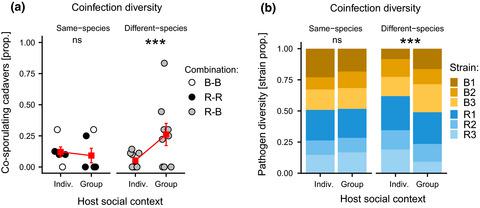当前位置:
X-MOL 学术
›
Ecol. Lett.
›
论文详情
Our official English website, www.x-mol.net, welcomes your feedback! (Note: you will need to create a separate account there.)
Social immunity modulates competition between coinfecting pathogens.
Ecology Letters ( IF 8.8 ) Pub Date : 2020-01-16 , DOI: 10.1111/ele.13458 Barbara Milutinović 1 , Miriam Stock 1 , Anna V Grasse 1 , Elisabeth Naderlinger 1 , Christian Hilbe 1 , Sylvia Cremer 1
Ecology Letters ( IF 8.8 ) Pub Date : 2020-01-16 , DOI: 10.1111/ele.13458 Barbara Milutinović 1 , Miriam Stock 1 , Anna V Grasse 1 , Elisabeth Naderlinger 1 , Christian Hilbe 1 , Sylvia Cremer 1
Affiliation

|
Coinfections with multiple pathogens can result in complex within-host dynamics affecting virulence and transmission. While multiple infections are intensively studied in solitary hosts, it is so far unresolved how social host interactions interfere with pathogen competition, and if this depends on coinfection diversity. We studied how the collective disease defences of ants - their social immunity - influence pathogen competition in coinfections of same or different fungal pathogen species. Social immunity reduced virulence for all pathogen combinations, but interfered with spore production only in different-species coinfections. Here, it decreased overall pathogen sporulation success while increasing co-sporulation on individual cadavers and maintaining a higher pathogen diversity at the community level. Mathematical modelling revealed that host sanitary care alone can modulate competitive outcomes between pathogens, giving advantage to fast-germinating, thus less grooming-sensitive ones. Host social interactions can hence modulate infection dynamics in coinfected group members, thereby altering pathogen communities at the host level and population level.
中文翻译:

社会免疫调节共同感染的病原体之间的竞争。
与多种病原体的共感染会导致宿主内部复杂的动态变化,从而影响毒力和传播。虽然在单独的宿主中对多种感染进行了深入研究,但至今仍未解决社会宿主之间的相互作用如何干扰病原体竞争,以及这是否取决于合并感染的多样性。我们研究了蚂蚁的集体疾病防御机制-它们的社会免疫力-在相同或不同真菌病原体种类的共感染中如何影响病原体竞争。社会免疫力降低了所有病原体组合的毒力,但仅在不同种类的共感染中干扰了孢子的产生。在这里,它降低了总体病原体形成成功率,同时增加了单个尸体上的共孢子形成并在社区一级维持了更高的病原体多样性。数学模型表明,单独的宿主卫生护理可以调节病原体之间的竞争结果,从而有利于快速发芽,因此对修饰的敏感性较低。因此,宿主社交互动可以调节合并感染的群体成员中的感染动态,从而在宿主水平和种群水平上改变病原体群落。
更新日期:2020-01-17
中文翻译:

社会免疫调节共同感染的病原体之间的竞争。
与多种病原体的共感染会导致宿主内部复杂的动态变化,从而影响毒力和传播。虽然在单独的宿主中对多种感染进行了深入研究,但至今仍未解决社会宿主之间的相互作用如何干扰病原体竞争,以及这是否取决于合并感染的多样性。我们研究了蚂蚁的集体疾病防御机制-它们的社会免疫力-在相同或不同真菌病原体种类的共感染中如何影响病原体竞争。社会免疫力降低了所有病原体组合的毒力,但仅在不同种类的共感染中干扰了孢子的产生。在这里,它降低了总体病原体形成成功率,同时增加了单个尸体上的共孢子形成并在社区一级维持了更高的病原体多样性。数学模型表明,单独的宿主卫生护理可以调节病原体之间的竞争结果,从而有利于快速发芽,因此对修饰的敏感性较低。因此,宿主社交互动可以调节合并感染的群体成员中的感染动态,从而在宿主水平和种群水平上改变病原体群落。



























 京公网安备 11010802027423号
京公网安备 11010802027423号